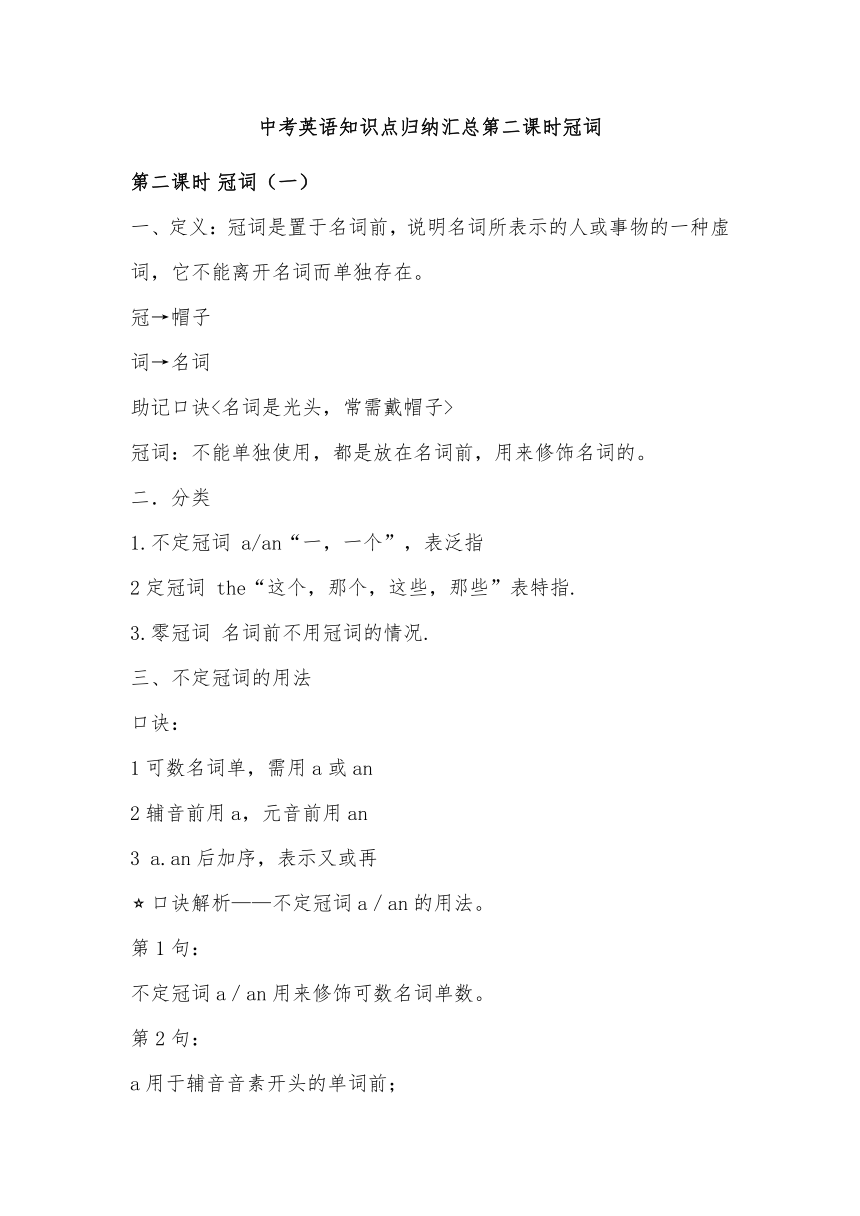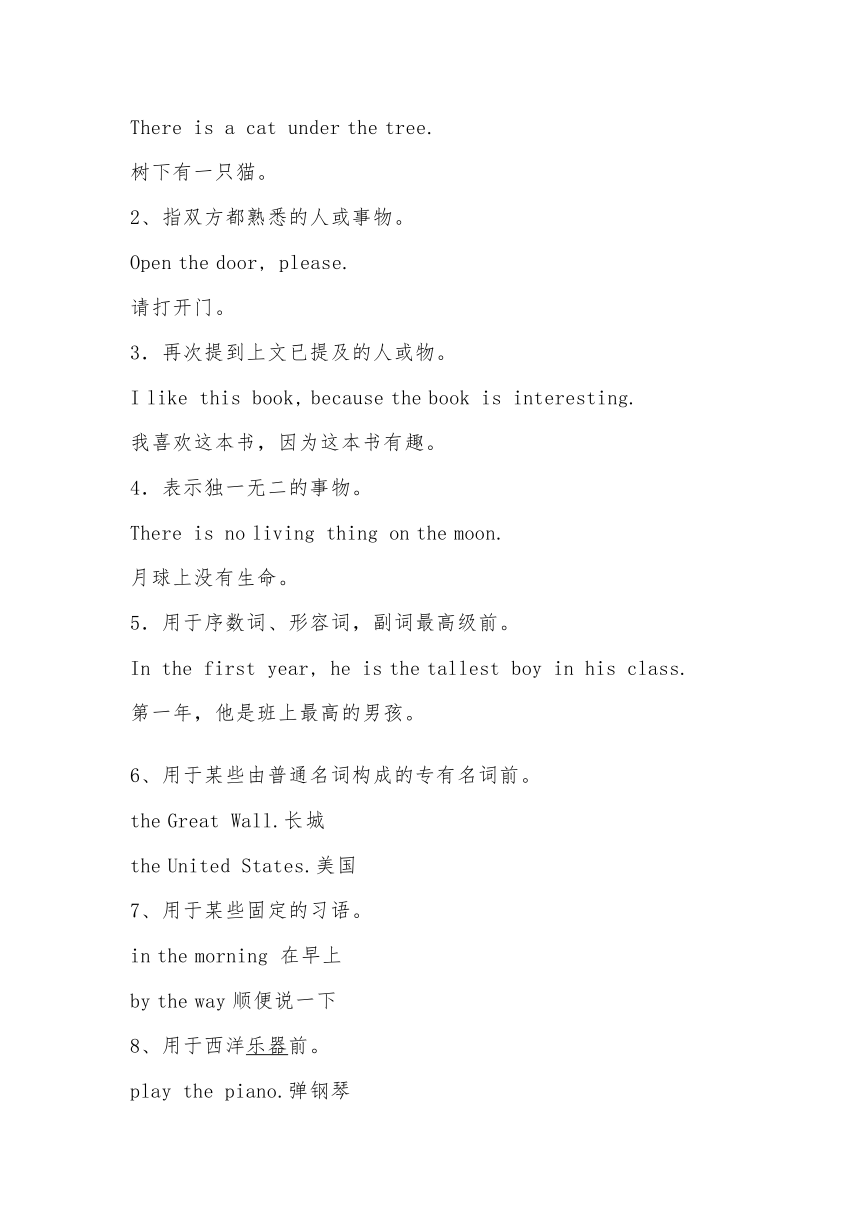2024年中考英语知识点归纳汇总第二课时冠词
文档属性
| 名称 | 2024年中考英语知识点归纳汇总第二课时冠词 |  | |
| 格式 | docx | ||
| 文件大小 | 21.9KB | ||
| 资源类型 | 教案 | ||
| 版本资源 | 通用版 | ||
| 科目 | 英语 | ||
| 更新时间 | 2024-01-26 18:53:27 | ||
图片预览



文档简介
中考英语知识点归纳汇总第二课时冠词
第二课时 冠词(一)
一、定义:冠词是置于名词前,说明名词所表示的人或事物的一种虚词,它不能离开名词而单独存在。
冠→帽子
词→名词
助记口诀<名词是光头,常需戴帽子>
冠词:不能单独使用,都是放在名词前,用来修饰名词的。
二.分类
1.不定冠词 a/an“一,一个”,表泛指
2定冠词 the“这个,那个,这些,那些”表特指.
3.零冠词 名词前不用冠词的情况.
三、不定冠词的用法
口诀:
1可数名词单,需用a或an
2辅音前用a,元音前用an
3 a.an后加序,表示又或再
口诀解析——不定冠词a/an的用法。
第1句:
不定冠词a/an用来修饰可数名词单数。
第2句:
a用于辅音音素开头的单词前;
an用于元音音素开头的单词前.
a book [buk]→辅音音素开头,用a
an orange [' rind ]→元音音素开头,用an.
a university [.ju:ni'v :s ti]
a useful book ['ju:sfl]
a European country [.ju r 'pi: n]
a one-year-old boy [w n]
an hour ['au ]
an honest glrl. [' nist]
选a还是an,和字母无关,只需看音标的第一个音素。
第3句:
a/an加序数词,表示“又一”“再-”(first除外)。
e.g. In order to find a good job, she planned to learn a second foreign language.
为了找到-份好工作,她打算再学一门外语。
四.定冠词的用法
口诀
特指双熟悉,上文已提及
世上独无二,序数最高级
某些专有名,习语和乐器
*口诀解析——定冠词the的用法
1、表示特指。
There is a cat under the tree.
树下有一只猫。
2、指双方都熟悉的人或事物。
Open the door, please.
请打开门。
3.再次提到上文已提及的人或物。
I like this book, because the book is interesting.
我喜欢这本书,因为这本书有趣。
4.表示独一无二的事物。
There is no living thing on the moon.
月球上没有生命。
5.用于序数词、形容词,副词最高级前。
In the first year, he is the tallest boy in his class.
第一年,他是班上最高的男孩。
6、用于某些由普通名词构成的专有名词前。
the Great Wall.长城
the United States.美国
7、用于某些固定的习语。
in the morning 在早上
by the way顺便说一下
8、用于西洋乐器前。
play the piano.弹钢琴
play the violin 拉小提琴
*补充
9.用在姓氏复数前,表示一家人。
The Greens are having dinner at home.
格林一家正在家吃晚餐。
10.用在形容词前,表示一类人或物。
the poor 穷人
the sick 病人
11.用在方向、方位前.
in the east 在东方
on the right 在右边
五.零冠词的用法
零冠词:就是名前不用冠词。
口诀
0 12 3 4 5 6 7 8 X
口诀解析
0:长得圆圆的,代表球类或棋类。
I play football every day.
我每天踢足球。
12:代表12个月份。
My birthday is in March
我的生日在三月。
3:代表3餐。
He has egg and milk for breakfast
他早餐吃鸡蛋和牛奶。
4:代表4季。
It's warm in spring.
春天很温暖。
5:五彩缤纷,代表颜色。
I like red very much.
我非常喜欢红色。
6:代表by+交通工具,中间不要冠词。
I go to school by bus
我坐公共汽车去上学。
7:代表一周的7天。
I don't need to work on Sundays
星期日我不需要上班。
8:吧啦吧啦说话,代表语言。
I can speak English
我能说英语。
X:代表学(xue)科.He doesn't like Chinese
他不喜欢语文。
不用冠词的情况,例:
1、除一些特殊情况外,专用名词以及抽象名词和物质名词前不加冠词。如:
Man is mortal.
Miss Smith came in power at last.
2、当名词前已有this, that, my, his, any, every, some, no, those, these等词修饰时或有所有格修饰时,不必加冠词。如:
She is my sister.
This article you had written is very wonderful.
3、在交通工具、学科名称等名词前不加冠词。如:
by plane by boat Chinese Physics
4、在节日、假日、星期、月份、季节等名词前不加冠词。如:
National Day May Day
Autumn January
5、在一日三餐、体育类等名词前不加冠词。如:
He prefers milk and egg for breakfast.
He preferred to play football and I’d rather play tennis.
6、在唯一的职务、头衔的名词前不加冠词。如:
He is elected manager of our company.
People elected him president of that country last year.
7、在报纸标题、图像说明、文章题目、标志、广告前不加冠词。如:
Worker’s Mind
Notes on the Study of Hong Lou Meng
8、在一些固定词组中不加冠词。如:
at home by mistake learn by heart
at first at last at once
by sea day and night
六.有the无the大不同
口诀
有the表地点;无the表动作
1.go to school去上学
go to the school 去学校
2.in hospital住院
in the hospital在医院
3.at table在进餐
at the table在桌子旁
4.in class在上课
in the class在班里
第二课时 冠词(一)
一、定义:冠词是置于名词前,说明名词所表示的人或事物的一种虚词,它不能离开名词而单独存在。
冠→帽子
词→名词
助记口诀<名词是光头,常需戴帽子>
冠词:不能单独使用,都是放在名词前,用来修饰名词的。
二.分类
1.不定冠词 a/an“一,一个”,表泛指
2定冠词 the“这个,那个,这些,那些”表特指.
3.零冠词 名词前不用冠词的情况.
三、不定冠词的用法
口诀:
1可数名词单,需用a或an
2辅音前用a,元音前用an
3 a.an后加序,表示又或再
口诀解析——不定冠词a/an的用法。
第1句:
不定冠词a/an用来修饰可数名词单数。
第2句:
a用于辅音音素开头的单词前;
an用于元音音素开头的单词前.
a book [buk]→辅音音素开头,用a
an orange [' rind ]→元音音素开头,用an.
a university [.ju:ni'v :s ti]
a useful book ['ju:sfl]
a European country [.ju r 'pi: n]
a one-year-old boy [w n]
an hour ['au ]
an honest glrl. [' nist]
选a还是an,和字母无关,只需看音标的第一个音素。
第3句:
a/an加序数词,表示“又一”“再-”(first除外)。
e.g. In order to find a good job, she planned to learn a second foreign language.
为了找到-份好工作,她打算再学一门外语。
四.定冠词的用法
口诀
特指双熟悉,上文已提及
世上独无二,序数最高级
某些专有名,习语和乐器
*口诀解析——定冠词the的用法
1、表示特指。
There is a cat under the tree.
树下有一只猫。
2、指双方都熟悉的人或事物。
Open the door, please.
请打开门。
3.再次提到上文已提及的人或物。
I like this book, because the book is interesting.
我喜欢这本书,因为这本书有趣。
4.表示独一无二的事物。
There is no living thing on the moon.
月球上没有生命。
5.用于序数词、形容词,副词最高级前。
In the first year, he is the tallest boy in his class.
第一年,他是班上最高的男孩。
6、用于某些由普通名词构成的专有名词前。
the Great Wall.长城
the United States.美国
7、用于某些固定的习语。
in the morning 在早上
by the way顺便说一下
8、用于西洋乐器前。
play the piano.弹钢琴
play the violin 拉小提琴
*补充
9.用在姓氏复数前,表示一家人。
The Greens are having dinner at home.
格林一家正在家吃晚餐。
10.用在形容词前,表示一类人或物。
the poor 穷人
the sick 病人
11.用在方向、方位前.
in the east 在东方
on the right 在右边
五.零冠词的用法
零冠词:就是名前不用冠词。
口诀
0 12 3 4 5 6 7 8 X
口诀解析
0:长得圆圆的,代表球类或棋类。
I play football every day.
我每天踢足球。
12:代表12个月份。
My birthday is in March
我的生日在三月。
3:代表3餐。
He has egg and milk for breakfast
他早餐吃鸡蛋和牛奶。
4:代表4季。
It's warm in spring.
春天很温暖。
5:五彩缤纷,代表颜色。
I like red very much.
我非常喜欢红色。
6:代表by+交通工具,中间不要冠词。
I go to school by bus
我坐公共汽车去上学。
7:代表一周的7天。
I don't need to work on Sundays
星期日我不需要上班。
8:吧啦吧啦说话,代表语言。
I can speak English
我能说英语。
X:代表学(xue)科.He doesn't like Chinese
他不喜欢语文。
不用冠词的情况,例:
1、除一些特殊情况外,专用名词以及抽象名词和物质名词前不加冠词。如:
Man is mortal.
Miss Smith came in power at last.
2、当名词前已有this, that, my, his, any, every, some, no, those, these等词修饰时或有所有格修饰时,不必加冠词。如:
She is my sister.
This article you had written is very wonderful.
3、在交通工具、学科名称等名词前不加冠词。如:
by plane by boat Chinese Physics
4、在节日、假日、星期、月份、季节等名词前不加冠词。如:
National Day May Day
Autumn January
5、在一日三餐、体育类等名词前不加冠词。如:
He prefers milk and egg for breakfast.
He preferred to play football and I’d rather play tennis.
6、在唯一的职务、头衔的名词前不加冠词。如:
He is elected manager of our company.
People elected him president of that country last year.
7、在报纸标题、图像说明、文章题目、标志、广告前不加冠词。如:
Worker’s Mind
Notes on the Study of Hong Lou Meng
8、在一些固定词组中不加冠词。如:
at home by mistake learn by heart
at first at last at once
by sea day and night
六.有the无the大不同
口诀
有the表地点;无the表动作
1.go to school去上学
go to the school 去学校
2.in hospital住院
in the hospital在医院
3.at table在进餐
at the table在桌子旁
4.in class在上课
in the class在班里
同课章节目录
